D. Alan Lewis's Blog, page 5
December 2, 2015
Holiday Guest Author: Robert Krog
This holiday season, I’ve decided to promote some of my writer friends and ask some of the questions that folks ask me. Today’s guest/victim is:
Robert Krog
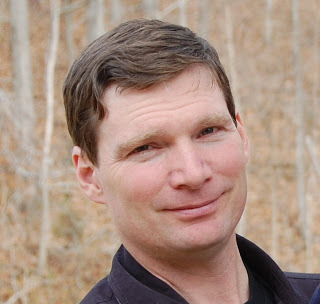
First, a little something about Robert.Robert is the author of the collection, The Stone Maiden and Other Tales, and the novella, A Bag Full of Eyes. He has numerous short stories in various publications. He is a native of Memphis, TN, and probably the most over-educated and inappropriately educated lawn care spray tech you’re likely to meet. He is a regular author guest at various conventions in and close to the midsouth. His website is: www.krogfiction.yolasite.com
At what age did you start writing or know that you wanted to write? I started writing when I was thirteen, basing my stories largely on other books I had read, on movies and games, too. I’d known for some time before that I wanted to be a writer, but had let the idea percolate. I sat down at one of those old word processors/type writer machines that were in use in that day, a bulky thing with a small screen and a very large keyboard. It printed from those reams of paper that had the perforated edges with holes in them. The story was titled “Night Over Solate,” and it was terrible, though I didn’t realize it at the time. I looked at it again a few years later and was very embarrassed by it. I hid it away and swore never to reveal it, but have since taken it out and begun a serious rewrite. It was a good idea, just executed poorly.
Where do your ideas come from? As with most ideas come up with by young writers, mine were first very derivative, being based largely on other peoples’ stories and worlds rather than on ideas and characters of my own invention. Nowadays, my ideas are a bit more original, insofar as there are any original ideas at all. I wrote, and was so fortunate as to have published, a novella titled A Bag Full of Eyes, the germ for which was the phrasing my wife used every morning and evening on placing and removed her contact lenses. She often says, “I’ll be just a minute, let me take my eyes out.” It’s an innocuous enough action but a fascinating phrasing. It sparked some fifteen thousand words. Such things as that spark stories. Why would anyone take eyes in and out at all? Who would do such a thing? A magical forensic expert might. There’s a story.
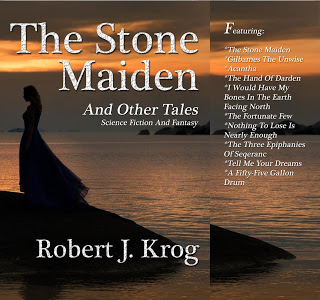
Do you base your characters on people you know or know of? Family or celebrities? And what sort of person is this magical forensic expert? I found the idea quirky that someone should remove the eyes of murder victims and place them into the eye sockets of investigators to replay their last visions, so I made the said expert a quirky character. I named him Victor for reasons I do not now recall, gave him a singular, lanky, somewhat mournful, yet humorous appearance and a personality to match, perhaps like a character out of the Munsters or the Adam’s Family might have had. He enters the story somewhat dignified and solemn but gradually reveals a rather silly and eccentric sense of humor.
Do you plot out your stories or just make it up as you go? Simultaneous with the character of Viktor I had to invent a plot to go with it. I’d already decided on murder victims, a forensic expert, and an investigator. Since I was using magic, I placed them in a fantasy setting. Then, because I was annoyed at the time with glittering vampires, I made the murderer a more standard, non-glittering vampire. That much of the story I had. The motive for murder was simple, given the needs of the murderer, but I had no compelling plot beyond that. I cast about for a time, going ahead and writing to introduce the situation and the characters without having any kind of clear conflict and resolution. I usually start with a clearer sense of the conflict, a clear beginning and a clear end, and at least a sense of the middle. On that occasion I had only so much. I wrote, describing the tools and process for removing and implanting eyes. Then I followed the character of the first murder victim, who turned out to be an elderly woman named Umma. Her vision had to go somewhere; I played with ideas and ended up giving her a large portion of the story. In the process I introduced another villain and added a more nuanced and pleasing conflict than the straightforward one with which I had started. I stopped at that point to take care and plot, reconciling the two conflicts so that both the original and new could be incorporated and resolved. I usually do that, working through a combination of plotting and making it up as I go.
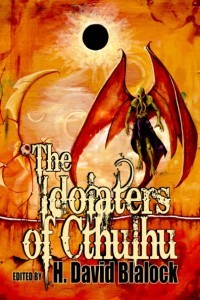
Which of your characters would you most like to meet in person? Which character of another author would you want to meet? I like most of my characters, the heroes at any rate, though not all of my villains are unsympathetic characters. The heroes are usually folks I’d admire if I met them in person. I try to write folks who are like myself or others I know on our good days, living up to our ideals more than failing miserably like I do most days. If they were real, and if I could meet just one of them, I would meet Clancy the Bronze Tiger from the soon to be published short story “See How Clever We Are” which will appear in Dreams of Steam Five from Dark Oak Press sometime in 2016. Clancy takes an interesting dip into insanity and has a strangely wise way of looking at things for an antagonist. If I could meet just one of some other author’s characters, I would choose to meet Gandalf from The Lord of the Rings. He’s wise, and I could stand to borrow some wisdom.
Which of your stories/books/works do you consider the best?I have two award winning stories out. One of them is the above-mentioned novella, A Bag Full of Eyes. The other is a short story titled “Eat Your Peas” which appears in the werewolf anthology Luna’s Children: Full Moon Mayhem. I have an author friend who insists that none of my works have ever since measured up to my first, professionally-published story “Babies’ Breath.” My wife’s favorite story of mine is one I wrote in high school, “Snowfall at Marci’s House,” which is a sweet story but hardly a masterpiece. I have yet to write one of those. Preference in fiction is a funny thing, and it’s funnier with authors. I’m awfully proud of quite a few of my stories, and they are usually ones that fall flat with at least some of those who’s opinions I value most. I wouldn’t have picked any of my nominated stories to win awards against the competition, and I consider my earlier work to be full of flaws in style that I have since attempted to correct. As it stands, I tend to like my newer work better based on the idea that I’m communicating more smoothly by removing flaws in style, but when I look back and reread my work, I find that the one I like the most is “Thursday Morrow” from the Dark Oak Press anthology, Capes and Clockwork. Something about that one really works, for me, at any rate. “See How Clever We Are” is close though.
How much of you is in your characters? There is a lot of me in my heroes, of course, but really, a lot more of people I admire. My heroes are people doing things that would probably be pretty hard for me to do, things which are hard for them to do but which they do anyway, because they’re heroes. And, of course, they succeed where I would probably fail, even if I tried. There’s also a lot of me in my villains, because it’s easy to write the flaws one knows, though being as critical of others as anyone else, I suppose, I put a lot of the flaws I fancy I don’t have myself, but deplore in others into my villains too.
Who are your inspirations? As long as we are on people that I admire, who therefore inspire me, I’ve a long list. Starting with authors: Tolkien and C. S. Lewis are at the top, with Chesterton close behind. Also: David Eddings, Robert Asprin, Tomie DePaola, and Shakespeare. There are so many that inspire. I’m missing a lot. Among authors that I personally know, I find that H. David Blalock and S. P. Dorning inspire, but they aren’t the only ones. Among non-authors, I had many story inspiring talks with my father, my mother, my pastor Fr. Guthrie, and several of my teachers and professors from high school and college, such as Br. Joel McGraw and Dr. William J. Murnane.
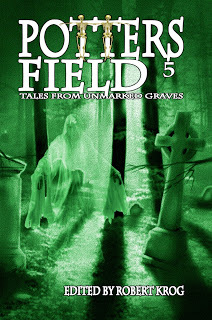
Is Writer’s Block ever a problem for you? If so, how do you deal with it? Inspiration notwithstanding, I do get writer’s block from time to time, usually if I’m tired or worried. Those types are easily enough handled by sleep and addressing that about which I am worried respectively. Those problems being separately resolved, I am able to return to writing. Occasionally, ideas just get stuck of themselves. When this occurs, I switch tasks, working on another story, or I go do something that keeps my body busy and frees my mind. Chores or work or exercise any one will usually do the trick. Sometimes, I have to sleep on it.
If you could live the life of one of your characters, who would it be? This is a hard one. Usually, my characters are put through a lot of difficult situations which I would not be up to handling. I’m too clumsy, too full of doubt, too impatient to deal with the sorts of things my characters have to handle. However, if living my character’s life means that I get to be that character, having that character’s strengths, I would want to be the nameless Sorcerer from “The Hand of Darden” in my collection The Stone Maiden and Other Tales. He’s lived long enough to have made his mistakes and learned from them, garnering a fair amount of wisdom in the process. He’s powerful and wily enough to defeat almost any enemy, and though he is quite old, he’s hardy and has a lot of fun.
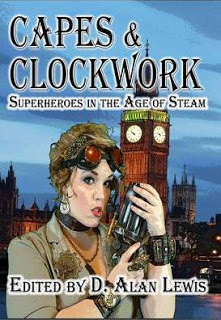
What is your latest project/release? I have two recent works out before the public. My story, “The Ones Who remember,” appeared this past summer in Idolaters of Cthulhu from Alban Lake Publishing. I co-edited Potter’s Field 5 from Alban Lake and my story “The Pauper’s Reaper” appears in it. It also came out past summer.
What are you working on now? Dark Oak Press is republishing my collection The Stone Maiden and Other Tales. It’s due out in early 2016, if all goes well. There are three previously-unpublished stories in this third edition. The new titles are “Gilbames the Unwise,” “A Fifty-Five Gallon Drum,” and “The Fortunate Few.” The first is about a human warrior who must take up the slack of a demigod who fell into a well a thousand years ago while wrestling a demon-troll. The second is about rednecks trying, with the help of a ceramic leprechaun, not to be evicted from their trailer. The third is about a boy and girl falling in love while going separate ways on the day the Dead King is supposed to return and end their world. I’m also hoping to have a screenplay based on my first professionally published story looked at seriously by local producer. I have an epic fantasy novel close to completion. I have two novellas also close to completion. I’ve had three short stories accepted for publication in different anthologies due out later in 2016. If things go as I hope, next year will be a good year.
Thanks Robert. To learn more about him, checkout his website:KrogFiction
Robert Krog

First, a little something about Robert.Robert is the author of the collection, The Stone Maiden and Other Tales, and the novella, A Bag Full of Eyes. He has numerous short stories in various publications. He is a native of Memphis, TN, and probably the most over-educated and inappropriately educated lawn care spray tech you’re likely to meet. He is a regular author guest at various conventions in and close to the midsouth. His website is: www.krogfiction.yolasite.com
At what age did you start writing or know that you wanted to write? I started writing when I was thirteen, basing my stories largely on other books I had read, on movies and games, too. I’d known for some time before that I wanted to be a writer, but had let the idea percolate. I sat down at one of those old word processors/type writer machines that were in use in that day, a bulky thing with a small screen and a very large keyboard. It printed from those reams of paper that had the perforated edges with holes in them. The story was titled “Night Over Solate,” and it was terrible, though I didn’t realize it at the time. I looked at it again a few years later and was very embarrassed by it. I hid it away and swore never to reveal it, but have since taken it out and begun a serious rewrite. It was a good idea, just executed poorly.
Where do your ideas come from? As with most ideas come up with by young writers, mine were first very derivative, being based largely on other peoples’ stories and worlds rather than on ideas and characters of my own invention. Nowadays, my ideas are a bit more original, insofar as there are any original ideas at all. I wrote, and was so fortunate as to have published, a novella titled A Bag Full of Eyes, the germ for which was the phrasing my wife used every morning and evening on placing and removed her contact lenses. She often says, “I’ll be just a minute, let me take my eyes out.” It’s an innocuous enough action but a fascinating phrasing. It sparked some fifteen thousand words. Such things as that spark stories. Why would anyone take eyes in and out at all? Who would do such a thing? A magical forensic expert might. There’s a story.

Do you base your characters on people you know or know of? Family or celebrities? And what sort of person is this magical forensic expert? I found the idea quirky that someone should remove the eyes of murder victims and place them into the eye sockets of investigators to replay their last visions, so I made the said expert a quirky character. I named him Victor for reasons I do not now recall, gave him a singular, lanky, somewhat mournful, yet humorous appearance and a personality to match, perhaps like a character out of the Munsters or the Adam’s Family might have had. He enters the story somewhat dignified and solemn but gradually reveals a rather silly and eccentric sense of humor.
Do you plot out your stories or just make it up as you go? Simultaneous with the character of Viktor I had to invent a plot to go with it. I’d already decided on murder victims, a forensic expert, and an investigator. Since I was using magic, I placed them in a fantasy setting. Then, because I was annoyed at the time with glittering vampires, I made the murderer a more standard, non-glittering vampire. That much of the story I had. The motive for murder was simple, given the needs of the murderer, but I had no compelling plot beyond that. I cast about for a time, going ahead and writing to introduce the situation and the characters without having any kind of clear conflict and resolution. I usually start with a clearer sense of the conflict, a clear beginning and a clear end, and at least a sense of the middle. On that occasion I had only so much. I wrote, describing the tools and process for removing and implanting eyes. Then I followed the character of the first murder victim, who turned out to be an elderly woman named Umma. Her vision had to go somewhere; I played with ideas and ended up giving her a large portion of the story. In the process I introduced another villain and added a more nuanced and pleasing conflict than the straightforward one with which I had started. I stopped at that point to take care and plot, reconciling the two conflicts so that both the original and new could be incorporated and resolved. I usually do that, working through a combination of plotting and making it up as I go.

Which of your characters would you most like to meet in person? Which character of another author would you want to meet? I like most of my characters, the heroes at any rate, though not all of my villains are unsympathetic characters. The heroes are usually folks I’d admire if I met them in person. I try to write folks who are like myself or others I know on our good days, living up to our ideals more than failing miserably like I do most days. If they were real, and if I could meet just one of them, I would meet Clancy the Bronze Tiger from the soon to be published short story “See How Clever We Are” which will appear in Dreams of Steam Five from Dark Oak Press sometime in 2016. Clancy takes an interesting dip into insanity and has a strangely wise way of looking at things for an antagonist. If I could meet just one of some other author’s characters, I would choose to meet Gandalf from The Lord of the Rings. He’s wise, and I could stand to borrow some wisdom.
Which of your stories/books/works do you consider the best?I have two award winning stories out. One of them is the above-mentioned novella, A Bag Full of Eyes. The other is a short story titled “Eat Your Peas” which appears in the werewolf anthology Luna’s Children: Full Moon Mayhem. I have an author friend who insists that none of my works have ever since measured up to my first, professionally-published story “Babies’ Breath.” My wife’s favorite story of mine is one I wrote in high school, “Snowfall at Marci’s House,” which is a sweet story but hardly a masterpiece. I have yet to write one of those. Preference in fiction is a funny thing, and it’s funnier with authors. I’m awfully proud of quite a few of my stories, and they are usually ones that fall flat with at least some of those who’s opinions I value most. I wouldn’t have picked any of my nominated stories to win awards against the competition, and I consider my earlier work to be full of flaws in style that I have since attempted to correct. As it stands, I tend to like my newer work better based on the idea that I’m communicating more smoothly by removing flaws in style, but when I look back and reread my work, I find that the one I like the most is “Thursday Morrow” from the Dark Oak Press anthology, Capes and Clockwork. Something about that one really works, for me, at any rate. “See How Clever We Are” is close though.
How much of you is in your characters? There is a lot of me in my heroes, of course, but really, a lot more of people I admire. My heroes are people doing things that would probably be pretty hard for me to do, things which are hard for them to do but which they do anyway, because they’re heroes. And, of course, they succeed where I would probably fail, even if I tried. There’s also a lot of me in my villains, because it’s easy to write the flaws one knows, though being as critical of others as anyone else, I suppose, I put a lot of the flaws I fancy I don’t have myself, but deplore in others into my villains too.
Who are your inspirations? As long as we are on people that I admire, who therefore inspire me, I’ve a long list. Starting with authors: Tolkien and C. S. Lewis are at the top, with Chesterton close behind. Also: David Eddings, Robert Asprin, Tomie DePaola, and Shakespeare. There are so many that inspire. I’m missing a lot. Among authors that I personally know, I find that H. David Blalock and S. P. Dorning inspire, but they aren’t the only ones. Among non-authors, I had many story inspiring talks with my father, my mother, my pastor Fr. Guthrie, and several of my teachers and professors from high school and college, such as Br. Joel McGraw and Dr. William J. Murnane.

Is Writer’s Block ever a problem for you? If so, how do you deal with it? Inspiration notwithstanding, I do get writer’s block from time to time, usually if I’m tired or worried. Those types are easily enough handled by sleep and addressing that about which I am worried respectively. Those problems being separately resolved, I am able to return to writing. Occasionally, ideas just get stuck of themselves. When this occurs, I switch tasks, working on another story, or I go do something that keeps my body busy and frees my mind. Chores or work or exercise any one will usually do the trick. Sometimes, I have to sleep on it.
If you could live the life of one of your characters, who would it be? This is a hard one. Usually, my characters are put through a lot of difficult situations which I would not be up to handling. I’m too clumsy, too full of doubt, too impatient to deal with the sorts of things my characters have to handle. However, if living my character’s life means that I get to be that character, having that character’s strengths, I would want to be the nameless Sorcerer from “The Hand of Darden” in my collection The Stone Maiden and Other Tales. He’s lived long enough to have made his mistakes and learned from them, garnering a fair amount of wisdom in the process. He’s powerful and wily enough to defeat almost any enemy, and though he is quite old, he’s hardy and has a lot of fun.

What is your latest project/release? I have two recent works out before the public. My story, “The Ones Who remember,” appeared this past summer in Idolaters of Cthulhu from Alban Lake Publishing. I co-edited Potter’s Field 5 from Alban Lake and my story “The Pauper’s Reaper” appears in it. It also came out past summer.
What are you working on now? Dark Oak Press is republishing my collection The Stone Maiden and Other Tales. It’s due out in early 2016, if all goes well. There are three previously-unpublished stories in this third edition. The new titles are “Gilbames the Unwise,” “A Fifty-Five Gallon Drum,” and “The Fortunate Few.” The first is about a human warrior who must take up the slack of a demigod who fell into a well a thousand years ago while wrestling a demon-troll. The second is about rednecks trying, with the help of a ceramic leprechaun, not to be evicted from their trailer. The third is about a boy and girl falling in love while going separate ways on the day the Dead King is supposed to return and end their world. I’m also hoping to have a screenplay based on my first professionally published story looked at seriously by local producer. I have an epic fantasy novel close to completion. I have two novellas also close to completion. I’ve had three short stories accepted for publication in different anthologies due out later in 2016. If things go as I hope, next year will be a good year.
Thanks Robert. To learn more about him, checkout his website:KrogFiction
Published on December 02, 2015 14:49
December 1, 2015
Holiday Guest Author: Kathleen Cosgrove
This holiday season, I’ve decided to promote some of my writer friends and ask some of the questions that folks ask me. Today’s guest/victim is:
Kathleen Cosgrove

First, a little something about Kathleen.Kathleen is a writer living in Murfreesboro, Tennessee, just a stone's throw from Nashville. Rubbing shoulders with some of the most creative and talented people on earth has nourished and helped her grow as a writer. She is best known for the unique voice she brings to all her writing. Her style of wit and humor along with snappy dialogue and offbeat characters have reviewers comparing her work to the likes of Janet Evanovich and Carl Hiaasen.She can also be found on-stage in venues in and around Nashville reading her always funny and sometimes touching memoirs.
At what age did you start writing? It’s funny because, I wrote my first novel when I was in the eighth grade. I most worked on it during biology class in school which could explain my failing grades but it was my attempt at some historical fiction. The first novel I ever read was, ”How Green Was My Valley,” a pretty hefty piece of literature for a young girl. The story and characters stayed with me for years and so by the time I was a teenager, I tried to write one of my own. I wish I still had it. I wrote a few children’s short stories when my own children were young, but didn’t really begin in earnest until I was in my fifties.
Where do your ideas come from? My ideas come to me when I’m writing, for the most part. Opening a Word Document and pressing the keys is the same as turning the keys on a car’s ignition. I will also get ideas taking long walks or drives. I don’t usually have the radio on or audio book going when I want to feel creative.
Do you base your characters on people you know? If you know my work, then you won’t be surprised to learn that most of the characters I create solely out of my own imagination. Those are the oddball characters that inhabit my novels. I love thinking them up out of pure ethos, breathing life into them and then giving them as many idiosyncrasies as I think the reader can stand. Having said that, many of the main characters are based on characteristics of people I know.
Do your plot your stories or make them up as you go? I plot them, but in a very nebulous way because once I start going in one direction, the characters take over the steering wheel and drive me down a road I didn’t know existed. I pull us all back but it’s a fight to the finish with those guys.
Do you listen to music when you write? I cannot have any music or other background noise. It’s like static interference and messes up where my head needs to be to create. Like my own little zone where nothing else can live.
Which of your characters would you most like to meet and who of another author? Of all the characters in my novels, I’d like to meet Rose, she’s a young police officer with a funny and bodacious attitude. In my short stories, it’s Sam Heart, a play off of the old Sam Spade novels by Dashiell Hammett. Of all of literature, then Jane Austen’s Mister Darcy of course.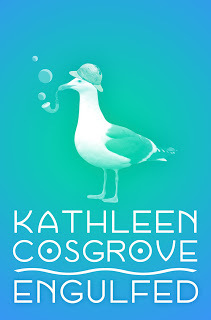
Which of your stories do you consider your best work? What are you working on right now?My humorous essays are by far my favorite pieces of writing, the thing I am most proud of. I came to the genre fairly recently as far as writing, but have been a big fan of the genre for years reading David Sedaris’ collections and Bossy Pants by Tina Fey. I’ve become so fond of writing them, and have accumulated so many, that I’m going to put them together in an anthology I’m titling, “The View From Under My Desk,” since my life begins with and is shaped by growing up in the “Duck and Cover,” years. It is my current work in progress although I do want to write another Maggie Finn novel. Two seems to be a weird place to leave it. I think trilogies worked well for Mario Puzo so, why not?How much do you write each day/ week / month? I try to never have a zero writing day. I try to write or revise or edit something every day.
What book do you read over and over the most? To Say Nothing of the Dog by Connie Willis is a novel I’ve read probably a half dozen times, maybe more. It’s technically Science Fiction because it’s a novel of time travel, but it’s so much more than that. It is clever and witty with some of the most endearing characters that stay with me from reading to reading. I’ve gone through the Horatio Hornblower novels more than once, Sherlock Holmes’ adventures many times and I’m having a second go at Neil Gaiman and Terry Pratchett’s Good Omens right now.
Is writer’s block ever a problem? Once when I felt like I had writer’s block my nine year old granddaughter advised I “bring in a mean girl.” It worked. I think adding any kind of conflict will get your brain busy trying to resolve it.
What would you advise aspiring authors? I think every aspiring writer should know that they are going to hate what they write and think it’s no good and decide to give up. It probably will be no good at the beginning and that’s a good thing because we learn by trying, by making mistakes and by not being afraid to be awful and make mistakes. Also, writers groups, if you can find a good one, can be worth their collective weight in gold.
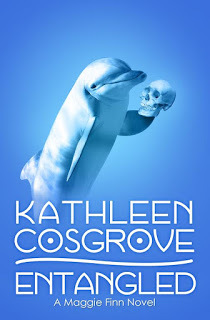
Do you read reviews? I do read the reviews and take the ones that are glowing and live off of them for days and the ones that are not so great, I try to learn from and see if the points are valid. If they’re just mean, I go and read bad reviews for Harry Potter or Moby Dick and then I feel much better.
Thanks Kathleen. To find her website, click below.
http://www.katcoz.com/
Kathleen Cosgrove

First, a little something about Kathleen.Kathleen is a writer living in Murfreesboro, Tennessee, just a stone's throw from Nashville. Rubbing shoulders with some of the most creative and talented people on earth has nourished and helped her grow as a writer. She is best known for the unique voice she brings to all her writing. Her style of wit and humor along with snappy dialogue and offbeat characters have reviewers comparing her work to the likes of Janet Evanovich and Carl Hiaasen.She can also be found on-stage in venues in and around Nashville reading her always funny and sometimes touching memoirs.
At what age did you start writing? It’s funny because, I wrote my first novel when I was in the eighth grade. I most worked on it during biology class in school which could explain my failing grades but it was my attempt at some historical fiction. The first novel I ever read was, ”How Green Was My Valley,” a pretty hefty piece of literature for a young girl. The story and characters stayed with me for years and so by the time I was a teenager, I tried to write one of my own. I wish I still had it. I wrote a few children’s short stories when my own children were young, but didn’t really begin in earnest until I was in my fifties.
Where do your ideas come from? My ideas come to me when I’m writing, for the most part. Opening a Word Document and pressing the keys is the same as turning the keys on a car’s ignition. I will also get ideas taking long walks or drives. I don’t usually have the radio on or audio book going when I want to feel creative.
Do you base your characters on people you know? If you know my work, then you won’t be surprised to learn that most of the characters I create solely out of my own imagination. Those are the oddball characters that inhabit my novels. I love thinking them up out of pure ethos, breathing life into them and then giving them as many idiosyncrasies as I think the reader can stand. Having said that, many of the main characters are based on characteristics of people I know.
Do your plot your stories or make them up as you go? I plot them, but in a very nebulous way because once I start going in one direction, the characters take over the steering wheel and drive me down a road I didn’t know existed. I pull us all back but it’s a fight to the finish with those guys.
Do you listen to music when you write? I cannot have any music or other background noise. It’s like static interference and messes up where my head needs to be to create. Like my own little zone where nothing else can live.
Which of your characters would you most like to meet and who of another author? Of all the characters in my novels, I’d like to meet Rose, she’s a young police officer with a funny and bodacious attitude. In my short stories, it’s Sam Heart, a play off of the old Sam Spade novels by Dashiell Hammett. Of all of literature, then Jane Austen’s Mister Darcy of course.

Which of your stories do you consider your best work? What are you working on right now?My humorous essays are by far my favorite pieces of writing, the thing I am most proud of. I came to the genre fairly recently as far as writing, but have been a big fan of the genre for years reading David Sedaris’ collections and Bossy Pants by Tina Fey. I’ve become so fond of writing them, and have accumulated so many, that I’m going to put them together in an anthology I’m titling, “The View From Under My Desk,” since my life begins with and is shaped by growing up in the “Duck and Cover,” years. It is my current work in progress although I do want to write another Maggie Finn novel. Two seems to be a weird place to leave it. I think trilogies worked well for Mario Puzo so, why not?How much do you write each day/ week / month? I try to never have a zero writing day. I try to write or revise or edit something every day.
What book do you read over and over the most? To Say Nothing of the Dog by Connie Willis is a novel I’ve read probably a half dozen times, maybe more. It’s technically Science Fiction because it’s a novel of time travel, but it’s so much more than that. It is clever and witty with some of the most endearing characters that stay with me from reading to reading. I’ve gone through the Horatio Hornblower novels more than once, Sherlock Holmes’ adventures many times and I’m having a second go at Neil Gaiman and Terry Pratchett’s Good Omens right now.
Is writer’s block ever a problem? Once when I felt like I had writer’s block my nine year old granddaughter advised I “bring in a mean girl.” It worked. I think adding any kind of conflict will get your brain busy trying to resolve it.
What would you advise aspiring authors? I think every aspiring writer should know that they are going to hate what they write and think it’s no good and decide to give up. It probably will be no good at the beginning and that’s a good thing because we learn by trying, by making mistakes and by not being afraid to be awful and make mistakes. Also, writers groups, if you can find a good one, can be worth their collective weight in gold.

Do you read reviews? I do read the reviews and take the ones that are glowing and live off of them for days and the ones that are not so great, I try to learn from and see if the points are valid. If they’re just mean, I go and read bad reviews for Harry Potter or Moby Dick and then I feel much better.
Thanks Kathleen. To find her website, click below.
http://www.katcoz.com/
Published on December 01, 2015 14:29
November 30, 2015
Holiday Guest Author: Alexander S. Brown
This holiday season, I’ve decided to promote some of my writer friends and ask them some of the same questions that folks ask me. Today’s guest/victim is:Alexander S. Brown
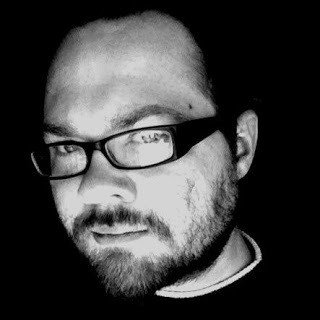
First, a little something about Alex.Alexander S. Brown is a Mississippi author who was published in 2008 with his first book Traumatized. Reviews for this short story collection were so favorable that it has been released as a special edition by Pro Se Press. Brown is currently one of the co-editors/coordinators with the Southern Haunts Anthologiespublished by Seventh Star Press. His horror novel Syrenthia Falls is represented by Dark Oak Press. He is also the author of multiple young adult steampunk stories found in the Dreams of Steam Anthologies, Capes and Clockwork Anthologies, and the anthology Clockwork Spells and Magical Bells. His more extreme works can be found in the anthology Luna’s Childrenpublished by Dark Oak Press and State of Horror: Louisiana Vol 1 published by Charon Coin Press.Visit Smashwords.com, Amazon.com, and Barnesandnoble.com to download his monthly short stories known as Single Shots. These are represented by Pro Se Press and they are known as stories that will be featured in the upcoming book The Night the Jack O’Lantern Went Out.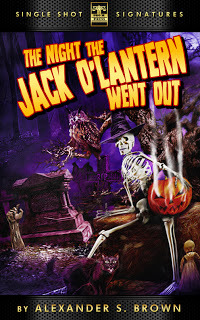
Do you base your characters on people you know or know of? Family or celebrities? It depends on the story. My character development can be inspired by people I know, strangers I watch, the news, celebrities, and literary figures.
Do you plot out your stories or just make it up as you go?I have tried plotting out stories, but the stories never turn out the way I planned. The characters take on a life of their own and I have no other choice but to document their decisions.
Which of your characters would you most like to meet in person? Which character of another author would you want to meet?I would like to meet Syrenthia from my novel Syrenthia Falls, she is a gray character that represents the beast hidden in all of us. As a villainess, she is a character that I hated to love. From another book, I would like to meet Lestat from Anne Rice’s Vampire Chronicles. He’s a rock and roll vampire, who wouldn’t want to get bitten by him?
What is your latest project/release?The anthology I composed with Louise Mysers Southern Haunts 3: Magick Beneath the Moonlight is my most current release. Southern Haunts: Spirits that Walk Among Us regarded ghosts, its sequel Devils in the Darkness regarded demons, and this volume regards occult practices amongst the southern states.
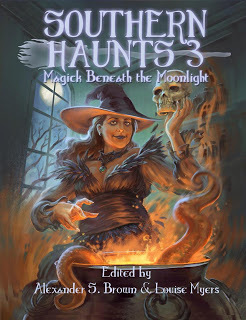
Do you have any signings or appearances coming up?I will attend Geekonomicon in Biloxi, MS on December 11,12 and 13 as a special guest.
Who were your inspirations?I was inspired by Stephen King, Clive Barker, Edgar Allan Poe, and H. P. Lovecraft during my teenage years. In my adulthood, I have found inspiration in Joe Hill, John Ajvide Lindqvist, Scott Sigler, and David Moody.
Do you have a dream project that you want to write in the future? My upcoming book The Night the Jack O’ Lantern Went Out is one of my dream projects. Besides this book, there are other horrors trapped in my head. I guess you could say that I have many dreams, or in my case, nightmares.
[image error]
How much of you is in your characters?Since the main characters in my horror stories are villains, very little of me can be seen. Between the genres I write, my steampunk characters reflect me most. Two characters who share most of my personality would be Dr. Xavier Hess (steampunk) and Syrenthia (horror).
Do you prefer writing short stories or novels? And why?I enjoy writing short stories as much as I do novels, but I enjoy them for different reasons. Short stories allow a minimal amount of time to create. In this small time frame, the author has to create likable characters, provide a solid setting, and get to the point. In a novel, the author is granted a much larger scale for world development, character development, and the opportunity to have a reader become emotionally attached to the characters. The challenge that either task provides is fun for me.
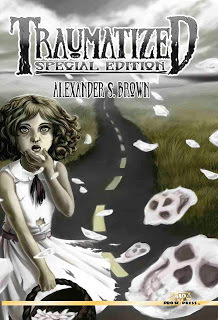
What are you working on now?I am currently editing my first fantasy/horror novel The Looking Glass Creatures which will be published by Seventh Star Press. For Pro Se Press I’m finishing Traumatized 2and will soon have edits complete for The Night the Jack O’ Lantern Went Out. I am also building characters for the Syrenthia Falls sequel.
What 3 things do you feel every aspiring writer should know?1. Write because you want to share your story not because of money.2. Write every day and don’t start editing until your story is complete. 3. Be a hard critic on yourself, but have enough confidence in yourself to know your story deserves to be read.
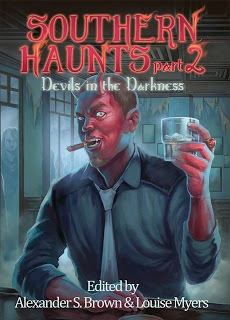
How do you use social media in regards to your writing?
Social media is extremely important to me. It allows me to connect with not only readers in my country but the world. My best advice is to go onto the internet to connect with others, have fun, and don’t be afraid to engage in conversation. Remember, when doing this, you have to sell yourself as a person no differently than you sell yourself as an author. Post updates on your work and your success, but also post updates in regards to your personal life, and share news that you find interesting.
Thanks Alex. To find his books, click below:Amazon.com

First, a little something about Alex.Alexander S. Brown is a Mississippi author who was published in 2008 with his first book Traumatized. Reviews for this short story collection were so favorable that it has been released as a special edition by Pro Se Press. Brown is currently one of the co-editors/coordinators with the Southern Haunts Anthologiespublished by Seventh Star Press. His horror novel Syrenthia Falls is represented by Dark Oak Press. He is also the author of multiple young adult steampunk stories found in the Dreams of Steam Anthologies, Capes and Clockwork Anthologies, and the anthology Clockwork Spells and Magical Bells. His more extreme works can be found in the anthology Luna’s Childrenpublished by Dark Oak Press and State of Horror: Louisiana Vol 1 published by Charon Coin Press.Visit Smashwords.com, Amazon.com, and Barnesandnoble.com to download his monthly short stories known as Single Shots. These are represented by Pro Se Press and they are known as stories that will be featured in the upcoming book The Night the Jack O’Lantern Went Out.

Do you base your characters on people you know or know of? Family or celebrities? It depends on the story. My character development can be inspired by people I know, strangers I watch, the news, celebrities, and literary figures.
Do you plot out your stories or just make it up as you go?I have tried plotting out stories, but the stories never turn out the way I planned. The characters take on a life of their own and I have no other choice but to document their decisions.
Which of your characters would you most like to meet in person? Which character of another author would you want to meet?I would like to meet Syrenthia from my novel Syrenthia Falls, she is a gray character that represents the beast hidden in all of us. As a villainess, she is a character that I hated to love. From another book, I would like to meet Lestat from Anne Rice’s Vampire Chronicles. He’s a rock and roll vampire, who wouldn’t want to get bitten by him?
What is your latest project/release?The anthology I composed with Louise Mysers Southern Haunts 3: Magick Beneath the Moonlight is my most current release. Southern Haunts: Spirits that Walk Among Us regarded ghosts, its sequel Devils in the Darkness regarded demons, and this volume regards occult practices amongst the southern states.

Do you have any signings or appearances coming up?I will attend Geekonomicon in Biloxi, MS on December 11,12 and 13 as a special guest.
Who were your inspirations?I was inspired by Stephen King, Clive Barker, Edgar Allan Poe, and H. P. Lovecraft during my teenage years. In my adulthood, I have found inspiration in Joe Hill, John Ajvide Lindqvist, Scott Sigler, and David Moody.
Do you have a dream project that you want to write in the future? My upcoming book The Night the Jack O’ Lantern Went Out is one of my dream projects. Besides this book, there are other horrors trapped in my head. I guess you could say that I have many dreams, or in my case, nightmares.
[image error]
How much of you is in your characters?Since the main characters in my horror stories are villains, very little of me can be seen. Between the genres I write, my steampunk characters reflect me most. Two characters who share most of my personality would be Dr. Xavier Hess (steampunk) and Syrenthia (horror).
Do you prefer writing short stories or novels? And why?I enjoy writing short stories as much as I do novels, but I enjoy them for different reasons. Short stories allow a minimal amount of time to create. In this small time frame, the author has to create likable characters, provide a solid setting, and get to the point. In a novel, the author is granted a much larger scale for world development, character development, and the opportunity to have a reader become emotionally attached to the characters. The challenge that either task provides is fun for me.

What are you working on now?I am currently editing my first fantasy/horror novel The Looking Glass Creatures which will be published by Seventh Star Press. For Pro Se Press I’m finishing Traumatized 2and will soon have edits complete for The Night the Jack O’ Lantern Went Out. I am also building characters for the Syrenthia Falls sequel.
What 3 things do you feel every aspiring writer should know?1. Write because you want to share your story not because of money.2. Write every day and don’t start editing until your story is complete. 3. Be a hard critic on yourself, but have enough confidence in yourself to know your story deserves to be read.

How do you use social media in regards to your writing?
Social media is extremely important to me. It allows me to connect with not only readers in my country but the world. My best advice is to go onto the internet to connect with others, have fun, and don’t be afraid to engage in conversation. Remember, when doing this, you have to sell yourself as a person no differently than you sell yourself as an author. Post updates on your work and your success, but also post updates in regards to your personal life, and share news that you find interesting.
Thanks Alex. To find his books, click below:Amazon.com
Published on November 30, 2015 08:40
November 28, 2015
Holiday Guest Author: Tom Wood
This holiday season, I’ve decided to promote some of my writer friends and ask some of the questions that folks ask me. Today’s guest/victim is:
Tom Woods
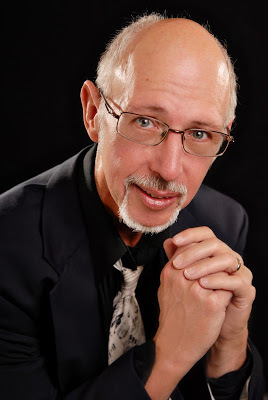
First, a little something about Tom.
Veteran sports writer and copy editor Tom Wood has covered a wide variety of events, ranging from Nashville universities to boxing, from the Iroquois Memorial Steeplechase to the 1996 Atlanta Olympic Games—for the Tennessean, where he also wrote a number of entertainment features. After his retirement from that newspaper, he has continued to contribute freelance articles for several news outlets.
At what age did you start writing or know that you wanted to write?
I’ve been writing since I was five years old, a story about my Grandmother coming for a visit. The story ended with a knock at the door and me opening it wide. The final line was ... “And there stood dear, old Grandma.” Not bad, considering my age. She kept it all her life and gave it back to me a few years before she died. I worked on my high school newspaper in Atlanta and on the college newspaper, yearbook and creative magazine at Middle Tennessee State University. That experience helped me land a part-time job in the sports department at The Tennessean, which I was able to turn into a 36-year career as a sportswriter and copy editor. I primarily covered local universities. I also wrote about boxing, covered the 1996 Atlanta Olympics and spent a couple of summers writing entertainment features for the paper. The last half of my career I devoted to writing headlines and editing. I'm enjoying creative writing again.
Where do your ideas come from?
Sometimes from the news, sometimes from books/other media, sometimes … the universe? I often feel like I’ve been led to an idea, being in the right place at the right time. In Vendetta Stone, for example, the novel is completely fictional, and not based on a true case as I am often asked. But I did get the idea for the novel from a Nashville murder several years ago. A teen-ager was murdered in a restaurant robbery and the father was being interviewed on the local TV newscast. The man was very angry and after the segment ended, I turned to my wife and said, "Wow, he doesn't want justice. He wants revenge." Then I added, "And so would I if something like that ever happened to you." Then I thought to myself, "That's a pretty good line," and couldn't let it go. An hour later, I was writing and trying to figure out how Jackson Stone would go about seeking vengeance for the murder of Angela. I don't have those skills, but Jackson does. It just took off from there. But the point is, if I hadn’t seen those couple of minutes of that particular newscast, I might never have gotten the idea for the book.
My first Western short story, “Death Takes a Holliday”—gambler/gunfighter Doc Holliday plays his last poker game against Death himself—came after reading an anthology called “Stagecoach” while I was sick. Every story had a stagecoach theme. All great stories, and after finishing, I thought, “I bet I could write one of those.” I turned on the TV, and Tombstonewas playing. I’d always been fascinated with the Old West, particularly Wyatt Earp, Doc and the Gunfight at OK Corral, and the story just flowed out of me. Again, right place, right time.
Do you base your characters on people you know or know of? Family or celebrities?
Having spent my working career as a journalist, I was privileged to meet some great characters in The Tennessean newsrooms. John Seigenthaler, John Bibb, Al Gore, Larry Woody, Jerry Thompson, Gale Kerr, Sandy Campbell, Nick Sullivan, David Climer—the list goes on and on. Wonderful reporters and writers, rich personalities—and all with great stories to tell. And you get to meet and interview some amazing personalities in the news business, both on and off the field. And I come from a family of great jokesters and story-tellers, my dad especially. He kept all us kids rapt with ghost stories and tales of growing up in North Carolina. Ditto for the TV reporters and editors I’ve known over the years. All of my characters have bits and pieces of all of us, but none specific. You want your characters to live and breathe on their own.
How much of you is in your characters?
A lot of readers think Vendetta Stone narrator Gerry Hilliard is me—except with hair. We both worked (he still does) for Nashville’s morning newspaper, so that’s a natural assumption. Gerry has character traits of a lot of newspaper folks I’ve known over the years. Ditto for the TV reporters and editors I’ve known over the years. The biggest difference between me and Gerry is that I spent my career in sports, not the crime beat. But there are overlaps in sports writing, when an athlete gets in legal trouble or when he gets hurt (medical writing) or a new pro franchise (business). Journalism is a great training ground for novelists.
My protagonist, Jackson Stone, is also a lot like me in that we’re both Christian. We share similar values and beliefs, in some respects, but differ in many others. He was a lot better athlete than I ever was, for one. And as a former Marine, he’s a heck of a lot tougher than me. I could not (and would not) do or make some of the choices he makes in Vendetta Stone. The book explores Jackson’s plan for revenge against his wife’s murderer, how he reconciles his faith and his motives. And he has to deal with backlash from the media, the police, his friends, co-workers and family, and his Pastor and Church family. Brother Robert Armstrong uses the Sunday pulpit to talk about the case. So there are a lot of subplots. But it's basically a fast-paced revenge/redemption story.
If you could live the life of one of your characters, who would it be?
Since I’ve pretty much lived Gerry’s life as a journalist, there’s a new character in the sequel I’m writing that I really like. His name is Mitch Westman and everybody calls him Cowboy. He is a former Marine sniper who is descended from a long line of Texas Rangers. His role was initially a minor one, but it has grown substantially—so much so that I may do a spinoff with him as protagonist. Cowboy’s had a hard life, but has lived it on his rough-and-tumble terms. We have little in common, so it’s been fun exploring his personality.
Do you plot out your stories or just make it up as you go?
I’m about 50/50 on plotting. Once I figure out the basic plot—the start, then mid-point and the finish—then I let the story tell itself on how to get from point A to B to C. Occasionally, I will run into a brick wall when writing this way, something doesn’t make sense or whatever, so I just back up and take the story in a different direction. Some writers plot chapter by chapter; it’s just whatever style works best for you. I have done more plotting for the second novel.
Do you listen to music while you write and if so, what do you listen too?
I grew up doing my homework with the stereo record player at full blast (driving my parents nuts). The volume’s not as high as today, but I do like having background music. Mostly last century music, generally 1950’s-70’s rock that I grew up on, some 80’s. I like new music, but not when writing. Occasionally soundscapes or country or big band or whatever it takes to get into the spirit of the scene I’m writing. When I was writing about the serial killer in Vendetta Stone, I would play heavy metal, darker lyrics. It worked.
Is Writer’s Block ever a problem for you? If so, how do you deal with it?
Not really, because of my journalistic training. I rely on the time-tested Five W’s and an H—Who, What, When, Where, Why and How—to answer every plotting question. Who’s the protag, the love interest, the killer? What happened to Baby Jane? When is the story set, last week, next year or next century? Where is the setting, the sea, the mountains, or in the dank basement of the house next to you? If so-and-so said or did this, what are the consequences? Why did it happen? Answer those questions and you’ll work through any blockage.
What is your funniest/ awkward moment at a convention/signing event?
At one signing, a little boy came in with his parents. They headed to the back of the store while he lingered over a book, thumbing through it. I smiled and said very pleasantly, “That’s my book.” His eyes grew wide, horrified, and he dropped the book and ran off to find his parents. I’ve had people tell me they don’t read books; I usually answer, “Well, they make great gifts for somebody in your family who does.” It works sometimes.
How much do you write each day/week?
Not as much as I should. When writing Vendetta Stone, I was still at the newspaper and wrote 2-3 hours before going to work, then wrote 8 hours on my days off. Since I self-published, I have to do everything, from booking appearances and doing promotion to keeping up with the financial end to, well, everything. As one writer friend put it, “writing is art and everything else is business.” And everything else cuts into the writing time. It’s been sporadic, but I am cutting back on PR aspects until the next book is finished. I need to write several hours each day to knock it out. Then the cycle will start all over again.
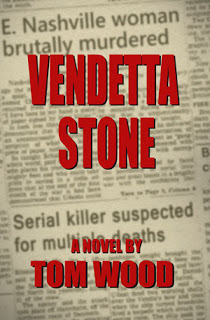
Favorite authors? What book do you read over and over the most?
I just finished re-reading I, The Jury by Mickey Spillane, one of my favorites. Mike Hammer was as tough as they come. I loved anything by Alistair MacLean, Mark Twain, Stephen King, John Grisham, Mario Puzo, Robert A. Heinlein, Arthur C. Clark, and so many others. I enjoy re-reading The Godfather and Stranger in a Strange Land. And I am a big fan of Louis L’Amour.
What is your latest project/release? What are you working on now?
Vendetta Stone (2013) was my first full-length novel, and it is the first in a series about Jackson Stone and his friends (and enemies). The sequel, tentatively titled Turn to Stone, is near completion and will be released sometime in 2016. I’ve mapped out five books in the series, but will keep writing about Jackson and his friends (and enemies) as long as people are interested. I’ve written a screenplay based on Vendetta Stone, and it made it to the semifinals of the 2015 Nashville Film Festival screenwriting competition, so we’ll see where that goes. I mentioned the Western short stories; I also have an ongoing Western anthology project with four other authors.
Thanks Tom. You can find his books here:Amazon.com
Published on November 28, 2015 22:07
November 27, 2015
Holiday Guest Author: Stephanie Osborn
This holiday season, I’ve decided to promote some of my writer friends and ask some of the questions that folks ask me. Today’s guest/victim is:
Stephanie Osborn
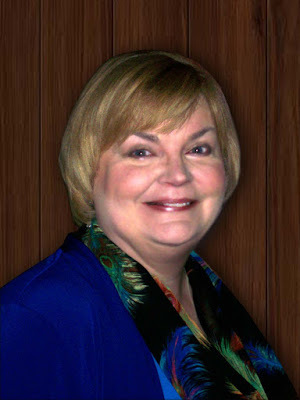
First, a little something about Stephanie.Stephanie is a retired rocket scientist turned writer who likes to mingle science fiction and mystery with a strong element of action thriller and a touch of romance. Her style has been described as, “Hard-edged SF that wraps a compelling mystery around ‘this is the real thing’ space science…tight, tense, and gripping. Osborn tells a damn good story, and tells it well.”
At what age did you start writing or know that you wanted to write?Wow. I started writing when I was a kid. I think I wrote my first poems in 3rd grade. I know I wrote a play when I was in 4th grade. It was horribly derivative of the television I was watching, but evidently my English teacher saw something in it, because she let me cast and produce it for the class. By grades 5-6, I was writing short stories, and when I was in high school I wrote a Sherlock Holmes short story and submitted it to the school literary magazine. They were blind-judged, and the English lit teacher threw it out for a plagiarism. She thought someone had copied down one of Arthur Conan Doyle’s original stories and submitted it.
Where do your ideas come from?If I knew that, I’d really have something going. I could even sell it! Closest I’ve ever been able to come is the half-formulated idea from the Displaced Detective books that writers record events from alternate universes. It’s as good an idea as any, I suppose.
Do you base your characters on people you know or know of? Family or celebrities? When I first started writing professionally, I used to mentally “cast” the characters. The leads would be actors/actresses, and the secondary characters might be based on people I knew. But now they are pretty much sprung whole-cloth from my imagination. I have to be reminded to Tuckerize people who have asked for it.
Do you plot out your stories or just make it up as you go?Oh heavens, a little of both, actually. Since I write some fairly hardcore mysteries, you pretty much got to do a LITTLE plotting, just to make sure you get your clues in the right places, and they point in the right direction. But my general inclination is to pants it.
Do you listen to music while you write and if so, what do you listen to?I used to. There were a couple of cable stations on TV that would play the local National Public Radio stations, and I’d listen to that, because it was largely classical or jazz. Then they took those off, and I find playing stuff on my laptop slows it down too much. If I do, it has to be something that is purely instrumental, otherwise I get distracted, singing along.
Which of your characters would you most like to meet in person? Which character of another author would you want to meet?I think I’d really love to meet Sherlock Holmes. We might not get along very well, but it would be interesting!
Which of your stories/books/works do you consider the best?Now, now. That’s like asking a parent which child is their favorite.
How much do you write each day/week?It varies. Depends on how much inspiration I have, and how much energy. My physical condition is a huge factor. If I’m sick or worn out, I haven’t the energy to create. When I’m in peak condition, with some real inspiration on, 5000 words a day is not unreasonable. The last couple-three years have been rough for me medically, though, so I’ve slowed down a bit.
What is your latest project/release?That would be Sherlock Holmes and the Mummy’s Curse, book 1 of the Gentleman Aegis series. It’s a prequel series to my Displaced Detectiveseries, about the adventures of “my” alternate-universe version of Sherlock Holmes, only it’s set long before he transitions to the modern day in our universe.
So think Holmes and Watson as very young men, still trying to find their way in the world. Their famous reputations are still in the future, cases are few and far between, so when one of Holmes’ old university professors invites them along on his Egyptian expedition to find the tomb of the first Pharaoh – a paying gig – they eagerly accept. But what they find is something quite different.
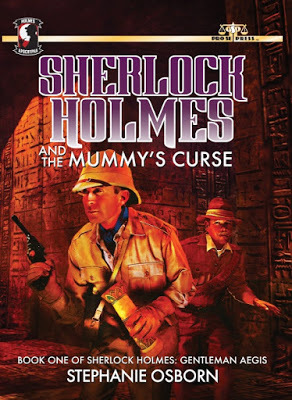 Do you have any signings or appearances coming up?I have the Killer Nashville mystery convention on Halloween weekend, and I’ll be at CONjuration in Atlanta in mid-November. After that, I tend to back off on conventions and such, and enjoy the holidays with family and friends. I’ll pick back up again in January. And I’ll certainly be doing interviews whenever anyone wants one.
Do you have any signings or appearances coming up?I have the Killer Nashville mystery convention on Halloween weekend, and I’ll be at CONjuration in Atlanta in mid-November. After that, I tend to back off on conventions and such, and enjoy the holidays with family and friends. I’ll pick back up again in January. And I’ll certainly be doing interviews whenever anyone wants one.
Who were your inspirations? Favorite authors?I’m going to lump these two questions together, because it’s kind of the same for me. Doyle, Tolkien, Bradbury, Asimov, Pournelle, Niven, Shakespeare, H.G. Wells, Dickens, Thoreau, Twain...I think you see the pattern there. I’ve also read Thomas Mallory, Dante, Aristotle, Plato, Stoker, Mary Shelley, Whitman, Sandburg, Sophocles, Euripedes, Aristophanes, Chaucer, and many more. Somewhat eclectic, and all classic. And yes, I’m an omnivorous reader.
What book do you read over and over the most?Oh geez. I’m thinking it’s a toss-up between Dicken’s A Christmas Caroland Wells’ War of the Worlds, though I read Doyle and Tolkien an awful lot too, especially Doyle. But I nearly always read War of the Worlds at Halloween, and A Christmas Carol at Christmas.
How much of you is in your characters?Very little, actually. It’s kind of funny; I have been accused of writing Dr. Skye Chadwick-Holmes, the wife of Sherlock Holmes in the Displaced Detective series, as my own personal Mary Sue – because she’s a world-class hyperspatial physicist, and I’m an astrophysicist, so it apparently seems obvious to some people that she MUST be me. But she’s not me, and hyperspatial physics is most assuredly NOT astrophysics. I can do astrophysics, but had to work hard and do a lot of research to ensure I got the description of the hyperspatial elements in the stories correct. I would really hate to have to sit down and work out the kinds of tensor analysis that I have Chadwick doing in the books.
In fact, any time I take one of those “What Literary Character Are You?” quizzes, I always come up as Sherlock Holmes. I was talking to a publisher friend about that dichotomy, and his response shocked me. He said, “Well, of course! You ARE Holmes! Your HUSBAND is Skye Chadwick!” And I had to admit, after thinking about it for a bit, that he was in many respects correct. And certainly Holmes is actually very easy for me to write. But I didn’t model either character upon myself OR my husband.
What genre do you prefer to write? To read? I’m pretty much an omnivorous reader. About the only thing I don’t read is horror, because I have a vivid imagination, anxiety disorder, and dream in color.
But I tend to write genre-crossing stories. I’m particularly fond of mixing science fiction and mystery, often throwing in strong romance and thriller elements. I just like that sort of story.
Do you prefer writing short stories or novels? And why?Novels, actually. I can and have done both, but it’s actually hard for me to write short stories. I do nearly the same amount of research for both, anyway. And somehow the story concepts seem to always blow up into novel-length!
Is Writer’s Block ever a problem for you? If so, how do you deal with it?Oh yeah. I get stuck every so often. I’ve even been known to write myself into corners. (Easier to do than you might think, when you write mysteries.) Brainstorming is my best solution. My husband is my best co-brainstormer, because he “gets” me and he’s probably more creative than I am. But if he’s not available, I have several friends that I check with, and will brainstorm with them. I’m planning a short story collection that ties into both the Displaced Detective and Gentleman Aegisseries, and it’ll be titled Project Tesseract: The Holmes Files. The concept is to chronicle alternate versions of Holmes – where he did NOT become a detective as such. And I had lots of help brainstorming all those short stories! I have the basic plots all sketched out for myself now; I just need the energy and time to write them.
What are you working on now?I generally have several projects going at any one time. Right now those projects are:· Heritage, book 4 of the Cresperian Saga, with Dan Hollifield,· Fear in the French Quarter, book 6 of the Displaced Detective series,· Project Tesseract: The Holmes Files.And I’m brainstorming several more, including:· Escape Velocity, the sequel to Burnout: The mystery of Space Shuttle STS-281 (I do have some written on this)· Sherlock Holmes in the Wild Hunt, book 2 of the Gentleman Aegis series· A Little Matter of Earthquakes, book 7 of the Displaced Detective series (I’ve got some written on this too)and a few other things besides. I also have the first book of a new series that is being shopped around. The series is The Adventures of Aemelia Gearheart, and the book is The Bellerophon Club. It’s a steampunk series.What 3 things do you feel every aspiring writer should know?A) It’s harder than you think. Writing and creating takes a lot of energy. If you’ve never done it, you’d be surprised. My writing mentor, Travis S. Taylor, described it to me as like running a mental marathon. And when your mind is envisioning all these action scenes, your body reacts, tensing, releasing adrenaline, preparing for fight or flight – whether you realize it or not.
B) It’s slower than you’d like. You’re not going to knock out the Great American Novel in a couple weeks. And once you start submitting it – to publishers, to agents – you have to give it more than two weeks for whoever you’ve submitted it to, to respond. I know some would-be authors who seriously expected a response inside a month, and got pissed when it didn’t happen, pulling the submission and going elsewhere, only to repeat the process. And yes, you guessed it – they’re still trying to get published. Look – if you’ve made an unsolicited submission, your manuscript goes on the “slush pile,” and an editor or professional reader will get to it...just as soon as s/he has worked down through all the stuff that was submitted before yours. Even if you have a solicited manuscript, you have to remember that editors have lives, and they have other projects, some of which might be due in the next few weeks, which puts those at the top of the priority list. (Don’t you want ‘em to devote so much attention to ensuring your baby is ready to hit the bookstore shelves? Then don’t denigrate ‘em doing so for other writers too.)
C) Don’t stop reading just because you’ve started to write. Now is the second most important time to read – the first being when you were younger, and absorbing everything you read. Now is the time to ensure you’ve read what I call “the good stuff” – the classics of literature. Why? There are multiple reasons why they’re classics, and you want to absorb all of that – because then, when you sit down to write, it’s going to distil out into your writing, and make it that much better. Now is the time to read what’s really popular, and try to analyze what makes it so popular – then try to apply that to your own writing. Now is the time to read your preferred genres, and figure out what makes them different – then sit down and try to put a new spin on it.
These are the things that can make a good writer great.
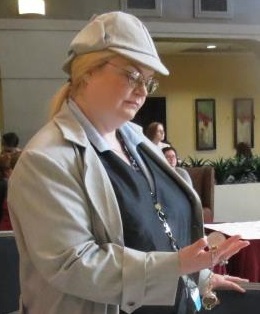
What is your funniest/ awkward moment at a convention/signing event?Oh, well you see, since I write science fiction, and have used UFOs, Area 51, Roswell, Rendlesham, and aliens, and because I’m a friendly, open sort, I tend to get a lot of the, ah, well...I’ve been told all about people’s alien abductions, including details such as the probing and stuff. Very much TMI, and I could really do without all those details...
Thanks Stephanie.You can find her books at:Amazon.com
Stephanie Osborn

First, a little something about Stephanie.Stephanie is a retired rocket scientist turned writer who likes to mingle science fiction and mystery with a strong element of action thriller and a touch of romance. Her style has been described as, “Hard-edged SF that wraps a compelling mystery around ‘this is the real thing’ space science…tight, tense, and gripping. Osborn tells a damn good story, and tells it well.”
At what age did you start writing or know that you wanted to write?Wow. I started writing when I was a kid. I think I wrote my first poems in 3rd grade. I know I wrote a play when I was in 4th grade. It was horribly derivative of the television I was watching, but evidently my English teacher saw something in it, because she let me cast and produce it for the class. By grades 5-6, I was writing short stories, and when I was in high school I wrote a Sherlock Holmes short story and submitted it to the school literary magazine. They were blind-judged, and the English lit teacher threw it out for a plagiarism. She thought someone had copied down one of Arthur Conan Doyle’s original stories and submitted it.
Where do your ideas come from?If I knew that, I’d really have something going. I could even sell it! Closest I’ve ever been able to come is the half-formulated idea from the Displaced Detective books that writers record events from alternate universes. It’s as good an idea as any, I suppose.
Do you base your characters on people you know or know of? Family or celebrities? When I first started writing professionally, I used to mentally “cast” the characters. The leads would be actors/actresses, and the secondary characters might be based on people I knew. But now they are pretty much sprung whole-cloth from my imagination. I have to be reminded to Tuckerize people who have asked for it.
Do you plot out your stories or just make it up as you go?Oh heavens, a little of both, actually. Since I write some fairly hardcore mysteries, you pretty much got to do a LITTLE plotting, just to make sure you get your clues in the right places, and they point in the right direction. But my general inclination is to pants it.
Do you listen to music while you write and if so, what do you listen to?I used to. There were a couple of cable stations on TV that would play the local National Public Radio stations, and I’d listen to that, because it was largely classical or jazz. Then they took those off, and I find playing stuff on my laptop slows it down too much. If I do, it has to be something that is purely instrumental, otherwise I get distracted, singing along.
Which of your characters would you most like to meet in person? Which character of another author would you want to meet?I think I’d really love to meet Sherlock Holmes. We might not get along very well, but it would be interesting!
Which of your stories/books/works do you consider the best?Now, now. That’s like asking a parent which child is their favorite.
How much do you write each day/week?It varies. Depends on how much inspiration I have, and how much energy. My physical condition is a huge factor. If I’m sick or worn out, I haven’t the energy to create. When I’m in peak condition, with some real inspiration on, 5000 words a day is not unreasonable. The last couple-three years have been rough for me medically, though, so I’ve slowed down a bit.
What is your latest project/release?That would be Sherlock Holmes and the Mummy’s Curse, book 1 of the Gentleman Aegis series. It’s a prequel series to my Displaced Detectiveseries, about the adventures of “my” alternate-universe version of Sherlock Holmes, only it’s set long before he transitions to the modern day in our universe.
So think Holmes and Watson as very young men, still trying to find their way in the world. Their famous reputations are still in the future, cases are few and far between, so when one of Holmes’ old university professors invites them along on his Egyptian expedition to find the tomb of the first Pharaoh – a paying gig – they eagerly accept. But what they find is something quite different.
 Do you have any signings or appearances coming up?I have the Killer Nashville mystery convention on Halloween weekend, and I’ll be at CONjuration in Atlanta in mid-November. After that, I tend to back off on conventions and such, and enjoy the holidays with family and friends. I’ll pick back up again in January. And I’ll certainly be doing interviews whenever anyone wants one.
Do you have any signings or appearances coming up?I have the Killer Nashville mystery convention on Halloween weekend, and I’ll be at CONjuration in Atlanta in mid-November. After that, I tend to back off on conventions and such, and enjoy the holidays with family and friends. I’ll pick back up again in January. And I’ll certainly be doing interviews whenever anyone wants one.Who were your inspirations? Favorite authors?I’m going to lump these two questions together, because it’s kind of the same for me. Doyle, Tolkien, Bradbury, Asimov, Pournelle, Niven, Shakespeare, H.G. Wells, Dickens, Thoreau, Twain...I think you see the pattern there. I’ve also read Thomas Mallory, Dante, Aristotle, Plato, Stoker, Mary Shelley, Whitman, Sandburg, Sophocles, Euripedes, Aristophanes, Chaucer, and many more. Somewhat eclectic, and all classic. And yes, I’m an omnivorous reader.
What book do you read over and over the most?Oh geez. I’m thinking it’s a toss-up between Dicken’s A Christmas Caroland Wells’ War of the Worlds, though I read Doyle and Tolkien an awful lot too, especially Doyle. But I nearly always read War of the Worlds at Halloween, and A Christmas Carol at Christmas.
How much of you is in your characters?Very little, actually. It’s kind of funny; I have been accused of writing Dr. Skye Chadwick-Holmes, the wife of Sherlock Holmes in the Displaced Detective series, as my own personal Mary Sue – because she’s a world-class hyperspatial physicist, and I’m an astrophysicist, so it apparently seems obvious to some people that she MUST be me. But she’s not me, and hyperspatial physics is most assuredly NOT astrophysics. I can do astrophysics, but had to work hard and do a lot of research to ensure I got the description of the hyperspatial elements in the stories correct. I would really hate to have to sit down and work out the kinds of tensor analysis that I have Chadwick doing in the books.
In fact, any time I take one of those “What Literary Character Are You?” quizzes, I always come up as Sherlock Holmes. I was talking to a publisher friend about that dichotomy, and his response shocked me. He said, “Well, of course! You ARE Holmes! Your HUSBAND is Skye Chadwick!” And I had to admit, after thinking about it for a bit, that he was in many respects correct. And certainly Holmes is actually very easy for me to write. But I didn’t model either character upon myself OR my husband.
What genre do you prefer to write? To read? I’m pretty much an omnivorous reader. About the only thing I don’t read is horror, because I have a vivid imagination, anxiety disorder, and dream in color.
But I tend to write genre-crossing stories. I’m particularly fond of mixing science fiction and mystery, often throwing in strong romance and thriller elements. I just like that sort of story.
Do you prefer writing short stories or novels? And why?Novels, actually. I can and have done both, but it’s actually hard for me to write short stories. I do nearly the same amount of research for both, anyway. And somehow the story concepts seem to always blow up into novel-length!
Is Writer’s Block ever a problem for you? If so, how do you deal with it?Oh yeah. I get stuck every so often. I’ve even been known to write myself into corners. (Easier to do than you might think, when you write mysteries.) Brainstorming is my best solution. My husband is my best co-brainstormer, because he “gets” me and he’s probably more creative than I am. But if he’s not available, I have several friends that I check with, and will brainstorm with them. I’m planning a short story collection that ties into both the Displaced Detective and Gentleman Aegisseries, and it’ll be titled Project Tesseract: The Holmes Files. The concept is to chronicle alternate versions of Holmes – where he did NOT become a detective as such. And I had lots of help brainstorming all those short stories! I have the basic plots all sketched out for myself now; I just need the energy and time to write them.
What are you working on now?I generally have several projects going at any one time. Right now those projects are:· Heritage, book 4 of the Cresperian Saga, with Dan Hollifield,· Fear in the French Quarter, book 6 of the Displaced Detective series,· Project Tesseract: The Holmes Files.And I’m brainstorming several more, including:· Escape Velocity, the sequel to Burnout: The mystery of Space Shuttle STS-281 (I do have some written on this)· Sherlock Holmes in the Wild Hunt, book 2 of the Gentleman Aegis series· A Little Matter of Earthquakes, book 7 of the Displaced Detective series (I’ve got some written on this too)and a few other things besides. I also have the first book of a new series that is being shopped around. The series is The Adventures of Aemelia Gearheart, and the book is The Bellerophon Club. It’s a steampunk series.What 3 things do you feel every aspiring writer should know?A) It’s harder than you think. Writing and creating takes a lot of energy. If you’ve never done it, you’d be surprised. My writing mentor, Travis S. Taylor, described it to me as like running a mental marathon. And when your mind is envisioning all these action scenes, your body reacts, tensing, releasing adrenaline, preparing for fight or flight – whether you realize it or not.
B) It’s slower than you’d like. You’re not going to knock out the Great American Novel in a couple weeks. And once you start submitting it – to publishers, to agents – you have to give it more than two weeks for whoever you’ve submitted it to, to respond. I know some would-be authors who seriously expected a response inside a month, and got pissed when it didn’t happen, pulling the submission and going elsewhere, only to repeat the process. And yes, you guessed it – they’re still trying to get published. Look – if you’ve made an unsolicited submission, your manuscript goes on the “slush pile,” and an editor or professional reader will get to it...just as soon as s/he has worked down through all the stuff that was submitted before yours. Even if you have a solicited manuscript, you have to remember that editors have lives, and they have other projects, some of which might be due in the next few weeks, which puts those at the top of the priority list. (Don’t you want ‘em to devote so much attention to ensuring your baby is ready to hit the bookstore shelves? Then don’t denigrate ‘em doing so for other writers too.)
C) Don’t stop reading just because you’ve started to write. Now is the second most important time to read – the first being when you were younger, and absorbing everything you read. Now is the time to ensure you’ve read what I call “the good stuff” – the classics of literature. Why? There are multiple reasons why they’re classics, and you want to absorb all of that – because then, when you sit down to write, it’s going to distil out into your writing, and make it that much better. Now is the time to read what’s really popular, and try to analyze what makes it so popular – then try to apply that to your own writing. Now is the time to read your preferred genres, and figure out what makes them different – then sit down and try to put a new spin on it.
These are the things that can make a good writer great.

What is your funniest/ awkward moment at a convention/signing event?Oh, well you see, since I write science fiction, and have used UFOs, Area 51, Roswell, Rendlesham, and aliens, and because I’m a friendly, open sort, I tend to get a lot of the, ah, well...I’ve been told all about people’s alien abductions, including details such as the probing and stuff. Very much TMI, and I could really do without all those details...
Published on November 27, 2015 11:26
November 26, 2015
Holiday Guest Author: M.N. Henschen
This holiday season, I've decided to promote some of my writer friends and ask some of the questions that folks always ask me. Today's guest/victim is:
M. N. Henschen
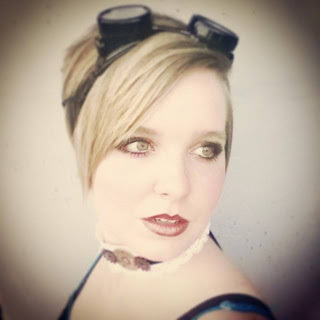
First, a little about M.N. Henschen.
She was born in the shadow of the Smoky Mountains in the bustling town of Sevierville, Tennessee. Her love of books began as an infant when her parents read stories of all kinds to her. This love and an expansive imagination were given more fuel in the classroom of Dr. Vada Bogart at the age of nine. It was then that M.N. Henschen began reading works like Lois Lowery’s The Giver and Wilson Rawl’s Where the Red Fern Grows. Her Favorite series of books, however, was also the story that sparked her interest in the world of fantasy: J.R.R. Tolkien’s The Lord of the Rings.
During her college years, M.N. Henschen studied language arts while pursuing her career in the medical field. It was there in 2008 that she began her first published work, The Line of Kavanagh. Thanks to the encouragement of her family and friends, what started out as a distant childhood dream became a reality, and her career as an author began.
Now a wife and mother of two, M.N. Henschen still lives in the beauty of East Tennessee, but she enjoys traveling the world with her family whenever possible. Working at the local hospital, she uses her storytelling abilities to brighten the days of those around her. She is thrilled now to be able to share her stories with the world.
At what age did you start writing or know that you wanted to write?I was very young when I first started writing. I believe I was eight or nine when I wrote my first poem. It was always that "rockstar" dream. Some kids want to be actors and astronauts, but I wanted to publish a book.
Where do your ideas come from?The idea for my first book came when I was thinking about my friends. I had so many great characters living daily life with me, and I wanted to write a story about them. It all just came together from there. My last two novels that are still in the works stemmed from dreams. I have really vivid dreams sometimes, and sometimes they have great stories in them.
Do you plot out your stories or just make it up as you go?I always have the entire story worked out from start to finish before I begin writing--usually in great detail. I don't outline, but I do have everything planned in my mind. That plan changes quite a lot, but the main story stays the same.
Do you listen to music while you write and if so, what do you listen too?ABSOLUTELY. I have a vast music library, and each of my books has its own playlist because each one has a different feel. Music is powerful, and words placed to music can change everything.
Which of your characters would you most like to meet in person? Which character of another author would you want to meet?Of my characters, I would love to meet Spade from my first novel. Bane would be my pick from my second. He's...delightfully strange. haha! From my third, I would LOVE to meet Elias. He's by far the most complicated of my characters.From other works, I would love to meet the Giver. I would also love to meet Haldir or Legolas from Lord of the Rings.
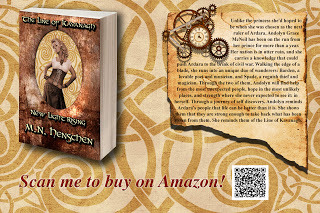
Which of your stories/books/works do you consider the best?That's very hard to say because all of my stories are so different and wonderful in their own ways. Line of Kavanagh is a fun, action-packed adventure. Rhythm of Enchantment is a sappy, hilarious, romantic comedy. To Survive Divinity is definitely the darkest thing I've ever written. It's probably the most profound thing I've ever written, too.
How much do you write each day/week?It varries widely from day to day. Sometimes I'll go three weeks without writing a word. Other times, I can't stop, and I write 6,000 words in a day. It really just depends on how inspired I am at the moment.
What is your latest project/release?That would be To Survive Divinity. It's set in a far-flung future where the Cataclysm has destroyed life as we know it. Out of the ashes rose people with great power. Like the ancient Greek gods, they each control one thing: Luck, Love, Healing, etc. Seven hundred years have passed, and one city offers six women to the gods of War and Death every year. The women must complete the Disciplines, and no one really knows what that means. If they do, though, they are made Brides to the god to which they were offered. The story centers on Kaija, a woman offered to the god of War. Being offered is typically the honor of a lifetime, but to Kaija, it's a prison sentence. She is not a believer. To her, the gods are simply men with power. She clings to a different faith, bringing with her an illegal copy of her "holy book." To Survive Divinity is her story of survival and keeping her faith in the face of very real, manifest gods. I'm hoping to have it out by the beginning of 2016.
Do you have any signings or appearances coming up?I will be in Atlanta, GA November 13th-15th at CONjuration, and I'll be at Yamacon in Pigeon Forge, TN in December.
Who were your inspirations?My former teacher Dr. Vada Bogart and my parents. They are both brilliant, and they have never failed to encourage me in chasing my dreams.
Favorite authors?J.R.R. Tolkein, C.S. Lewis, Lois Lowery, and Harper Lee
What book do you read over and over the most?Lord of the Rings
Is there a book or book series that you recommend to people?I always tell people to read the Giver quartet. They're short, little books, but they're SO powerful.
How much of you is in your characters?All of me. My characters ARE my stories.
If you could live the life of one of your characters, who would it be?Probably Rory from Rhythm of Enchantment. She's got the happiest life of all my female leads.
What genre do you prefer to write? To read?Anything fantasy, really.
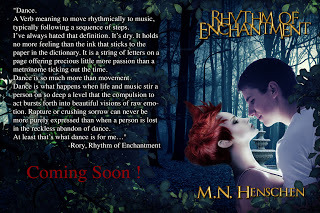
What are you working on now?Two new novels (Rhythm and Divinity) and the sequel to my first book.
Is Writer’s Block ever a problem for you? If so, how do you deal with it.I think it's a problem for all of us. For me, I just begin work on one of my other novels when I get blocked on one. That's the handy trick about writing three at the same time.
What 3 things do you feel every aspiring writer should know?I think they should know to let the professionals help, to not ever rush themselves, and most importantly, I feel they should know that they can do it. They can be an author.
What is your funniest/ awkward moment at a convention/signing event?That would probably be the time that I forgot to set my alarm, and I woke up as the con was starting. It wasn't my best start to a day. haha! I still managed to sell out that weekend and have a GREAT day.
How do you use social media in regards to your writing?I use it as a way to promote and network with other authors in addition to just keeping my readers updated on my progress.
Do you read reviews of your books? If so, have you ever engaged a reviewer over comments they’ve made?I ALWAYS read the reviews. I have only reached out to one reviewer, and that was because they rated the book at four stars, but they didn't say what needed improvement. I love hearing positive and negative feedback so that I can grow as an author, so I would have loved to have known what they thought needed work.
Thanks for taking some time for questions. You can find M.N.'s book here:Amazon.com
Published on November 26, 2015 12:02
November 9, 2015
Alan's work is out in Audio.
Alan's work is out in audio!!!
Audio books have been popular for many years. But with the selling power of Amazon and Audible.com, audio books have exploded. Two of Alan's works are in audio format, with two more (The Blood in Snowflake Garden & The Lightning Bolts of Zeus) on the way.
And one of Alan's publishers, Pro Se Productions, is working with Radio Archives to bring The Bishop of Port Victoria, plus a number of anthologies that include Alan's stories to audio book fans.
Click on the books below to check out the Audible.com pages.
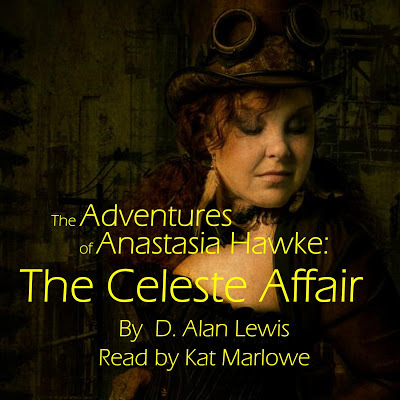 http://www.audible.com/pd/Fiction/The-Adventures-of-Anastasia-Hawke-The-Celeste-Affair-Audiobook/B016C5XYKO/ref=a_search_c4_1_1_srTtl?qid=1447131700&sr=1-1
http://www.audible.com/pd/Fiction/The-Adventures-of-Anastasia-Hawke-The-Celeste-Affair-Audiobook/B016C5XYKO/ref=a_search_c4_1_1_srTtl?qid=1447131700&sr=1-1
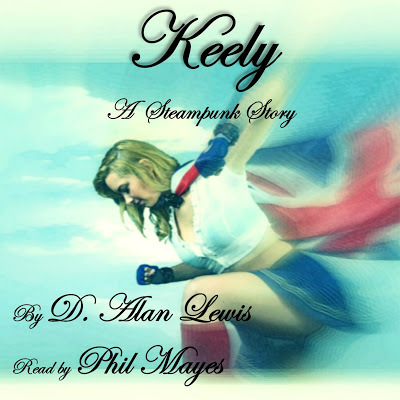 http://www.audible.com/pd/Sci-Fi-Fantasy/Keely-Audiobook/B015D98EUA/ref=a_search_c4_1_1_srTtl?qid=1447131923&sr=1-1
http://www.audible.com/pd/Sci-Fi-Fantasy/Keely-Audiobook/B015D98EUA/ref=a_search_c4_1_1_srTtl?qid=1447131923&sr=1-1
Audio books have been popular for many years. But with the selling power of Amazon and Audible.com, audio books have exploded. Two of Alan's works are in audio format, with two more (The Blood in Snowflake Garden & The Lightning Bolts of Zeus) on the way.
And one of Alan's publishers, Pro Se Productions, is working with Radio Archives to bring The Bishop of Port Victoria, plus a number of anthologies that include Alan's stories to audio book fans.
Click on the books below to check out the Audible.com pages.
 http://www.audible.com/pd/Fiction/The-Adventures-of-Anastasia-Hawke-The-Celeste-Affair-Audiobook/B016C5XYKO/ref=a_search_c4_1_1_srTtl?qid=1447131700&sr=1-1
http://www.audible.com/pd/Fiction/The-Adventures-of-Anastasia-Hawke-The-Celeste-Affair-Audiobook/B016C5XYKO/ref=a_search_c4_1_1_srTtl?qid=1447131700&sr=1-1 http://www.audible.com/pd/Sci-Fi-Fantasy/Keely-Audiobook/B015D98EUA/ref=a_search_c4_1_1_srTtl?qid=1447131923&sr=1-1
http://www.audible.com/pd/Sci-Fi-Fantasy/Keely-Audiobook/B015D98EUA/ref=a_search_c4_1_1_srTtl?qid=1447131923&sr=1-1
Published on November 09, 2015 21:02
June 12, 2015
A review of Hard Day's Knight
A review of Hard Day's Knightby John G. Hartness
[image error]
Hard Day’s Knight is a catchy title for a catchy book.
Set in Charlotte, NC, a place the author knows well from what I can gather from the great descriptions and knowledge of the city’s streets. A pair of vampires, Jimmy Black and Greg Knight own and operate the Black Knight Detective Agency. Both are young in appearance since they were ‘turned’ in their younger days, but they’ve got some years on them. That doesn’t, however stop the pair form acting their age. Mischievous, goofy and constantly popping off with pop culture references, they go about the business of solving crimes, albeit Greg prefers doing so while dressed up as a would-be vampiric superhero.
Honestly, when this part first came up, I couldn’t help but picture Jack Black, dressed up in the Adam West-era Batman suit while dangling from a bat-rope.
Their client, worried that he’d be cursed by a local witch, hires them for protection, but the case takes them in an unsuspected direction. Local children, a lot of them are going missing. Witches, demons, and a ticked-off lady cop are no match for our boys, though.
Hard Day’s Knight is the first book in the Black Knight Chronicles by John G. Hartness. While vampires have been all the rage over the past several years, this story takes a different look and a unique approach to the vampire lore.
Hartness’s writing is well above par, his story telling is excellent, and his characters are just a blast to watching in action. The story is tight and leaves off with plenty of room for future volumes.
Highly recommended.
http://www.amazon.com/Hard-Days-Knigh...
Published on June 12, 2015 03:00
June 8, 2015
Thieftaker
Thieftakerby D.B. Jackson
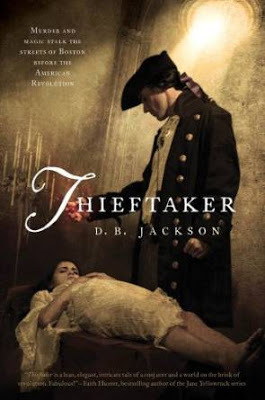
At first, I thought Thieftaker would be a tale of just another paranormal detective, told in a noir style and set in some cliché setting, geared to catch the attention of the would-be reader. There seems to be a lot of those around these days. What Thieftaker turned out to be was an incredibly well-written novel that grabbed me immediately.
The story starts off in Boston in 1765. The city is reeling from the turbulent events as growing talk of revolution is whispered in the shadow-laden corners. But our hero, Ethan Kaille isn’t interested in any of that nonsense. He is a thieftaker, a detective of sorts who uses spells and conjuring as a means of helping him solve cases. He has a strict personal policy to work on cases of stolen property, while steering clear of most everything else, especially anything having to do with homicides. That is, until he is hired to locate a stolen necklace, wore by a young woman who’d been recently murdered. The trinket had been around her neck at the time of the killing, and her father wants the item found and returned. Of course, both he and her father are aware that finding the necklace may reveal the murderer. None the less, Kallie accepts and takes the case. Conspiracies abound as city leaders, potential rebels and Kallie’s thieftaker competition are mixed into the case.
There are a number of factors that endear this book to me.
First off, the writing is superb. The story-telling is slowly paced but in a good way, giving the reader time to absorb everything going on in this richly detail world that the author has created.
Second, the historical aspects are a big hit with me. The fictional tale weaves in various Revolutionary War heroes and founding fathers, as wells as some actual events from the time period to make the world feel as close as possible to being there. The descriptions of Boston, the various neighborhoods and other locations throughout the city also add the to historical nature of the setting and help the reader to feel the cobblestones under his or her feet.
Thirdly, the characters are well defined, showing us not only the good but the flaws as well. Even the villains are presented in such a three dimensional manner that you can empathize with their reasoning for doing what they do, instead of being the typical dastardly, hand-bar mustache wearing cartoons badguys which appear in far too many books of this genre. Kallie, himself is a deeply flawed man, with a lot of backstory that this first book only touches on. We’re given a wonderful character while knowing there is far more is to come from his dark past in future tales.
Finally, Kallie’s lack of political interest. With a story set in the pre-war era, the story touches on the growing struggle for independence. This could easily have gone in the wrong way with our hero using his talents to help the rebels and spur on the Revolution. Instead, Kallie has little interest in the looming war, the rebel cause, or politics in general. He is a man dedicated to his work, regardless of the historical events happening around him. Personally, I really loved that he just did his job while the reader is watching not just him but the seeds of the Revolutionary War being sown.
D.B. Jackson, aka David B. Coe has done a bang-up job on this one and I look forward to reading the rest in this series. Highly recommended.

At first, I thought Thieftaker would be a tale of just another paranormal detective, told in a noir style and set in some cliché setting, geared to catch the attention of the would-be reader. There seems to be a lot of those around these days. What Thieftaker turned out to be was an incredibly well-written novel that grabbed me immediately.
The story starts off in Boston in 1765. The city is reeling from the turbulent events as growing talk of revolution is whispered in the shadow-laden corners. But our hero, Ethan Kaille isn’t interested in any of that nonsense. He is a thieftaker, a detective of sorts who uses spells and conjuring as a means of helping him solve cases. He has a strict personal policy to work on cases of stolen property, while steering clear of most everything else, especially anything having to do with homicides. That is, until he is hired to locate a stolen necklace, wore by a young woman who’d been recently murdered. The trinket had been around her neck at the time of the killing, and her father wants the item found and returned. Of course, both he and her father are aware that finding the necklace may reveal the murderer. None the less, Kallie accepts and takes the case. Conspiracies abound as city leaders, potential rebels and Kallie’s thieftaker competition are mixed into the case.
There are a number of factors that endear this book to me.
First off, the writing is superb. The story-telling is slowly paced but in a good way, giving the reader time to absorb everything going on in this richly detail world that the author has created.
Second, the historical aspects are a big hit with me. The fictional tale weaves in various Revolutionary War heroes and founding fathers, as wells as some actual events from the time period to make the world feel as close as possible to being there. The descriptions of Boston, the various neighborhoods and other locations throughout the city also add the to historical nature of the setting and help the reader to feel the cobblestones under his or her feet.
Thirdly, the characters are well defined, showing us not only the good but the flaws as well. Even the villains are presented in such a three dimensional manner that you can empathize with their reasoning for doing what they do, instead of being the typical dastardly, hand-bar mustache wearing cartoons badguys which appear in far too many books of this genre. Kallie, himself is a deeply flawed man, with a lot of backstory that this first book only touches on. We’re given a wonderful character while knowing there is far more is to come from his dark past in future tales.
Finally, Kallie’s lack of political interest. With a story set in the pre-war era, the story touches on the growing struggle for independence. This could easily have gone in the wrong way with our hero using his talents to help the rebels and spur on the Revolution. Instead, Kallie has little interest in the looming war, the rebel cause, or politics in general. He is a man dedicated to his work, regardless of the historical events happening around him. Personally, I really loved that he just did his job while the reader is watching not just him but the seeds of the Revolutionary War being sown.
D.B. Jackson, aka David B. Coe has done a bang-up job on this one and I look forward to reading the rest in this series. Highly recommended.
Published on June 08, 2015 20:14
June 3, 2015
The Adventures of Anastasia Hawke: The Celeste Affair
The Adventures of Anastasia Hawke: The Celeste Affair
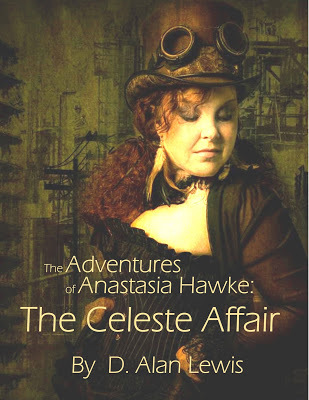
Celeste is an airship like no other, completely automated, incredibly powerful, and hell-bent on the destruction of Washington D.C. and the end of Abraham Lincoln’s presidency.
Anastasia Hawke, an agent for the newly formed Secret Service, and her young daughter are caught up in the chase to stop it. Enlisting the aid of the captain of the British Air Navy’s Flagship, they race across the Atlantic in a desperate attempt to prevent it from completing its function and prolonging the American Civil War.
But tensions rise between Anastasia and the Ship’s captain, Lucius Bishop as their personal lives collide. She is left to decide on the course of her and her daughter’s future while the future of America teeters in the balance.
The Celeste Affair was originally published in an abbreviated form in Dark Oak Press's pirate anthology, 'A Tall Ship, A Star, and Plunder'. But now it is available in its full form. The story centers around Anastasia Hawke, mother of the Hawke Girls ( Jasmine and Thyme) from 'The Lightning Bolts of Zeus'.
The Celeste Affair is the first in a series of shorts featuring Anastasia.
http://www.amazon.com/Adventures-Anastasia-Hawke-Celeste-Affair-ebook/dp/B00YGIAR5U/ref=sr_1_1?ie=UTF8&qid=1433328521&sr=8-1&keywords=celeste+affair

Celeste is an airship like no other, completely automated, incredibly powerful, and hell-bent on the destruction of Washington D.C. and the end of Abraham Lincoln’s presidency.
Anastasia Hawke, an agent for the newly formed Secret Service, and her young daughter are caught up in the chase to stop it. Enlisting the aid of the captain of the British Air Navy’s Flagship, they race across the Atlantic in a desperate attempt to prevent it from completing its function and prolonging the American Civil War.
But tensions rise between Anastasia and the Ship’s captain, Lucius Bishop as their personal lives collide. She is left to decide on the course of her and her daughter’s future while the future of America teeters in the balance.
The Celeste Affair was originally published in an abbreviated form in Dark Oak Press's pirate anthology, 'A Tall Ship, A Star, and Plunder'. But now it is available in its full form. The story centers around Anastasia Hawke, mother of the Hawke Girls ( Jasmine and Thyme) from 'The Lightning Bolts of Zeus'.
The Celeste Affair is the first in a series of shorts featuring Anastasia.
http://www.amazon.com/Adventures-Anastasia-Hawke-Celeste-Affair-ebook/dp/B00YGIAR5U/ref=sr_1_1?ie=UTF8&qid=1433328521&sr=8-1&keywords=celeste+affair
Published on June 03, 2015 03:52



